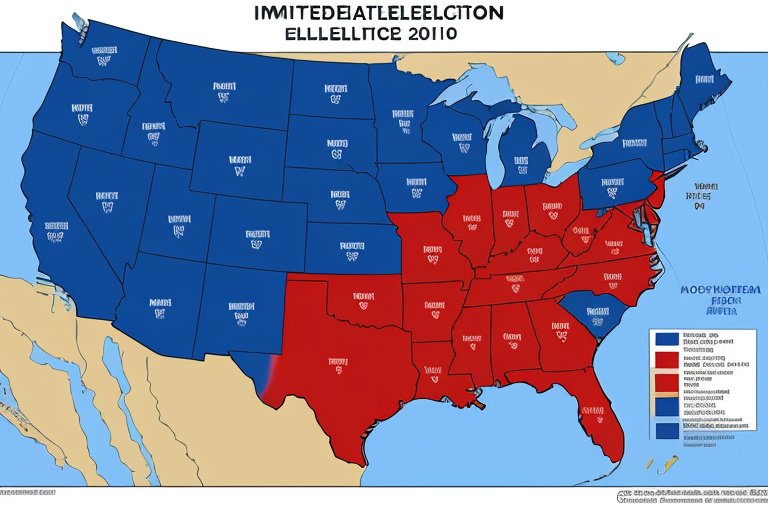The Importance of the Electoral College Debate
The Electoral College is a system that has been used to elect the President of the United States since the country’s founding. It is a unique system that has been both praised and criticized for its ability to elect the President. The debate surrounding the Electoral College has been ongoing for decades, with some calling for its reform or abolition, while others believe it should be maintained.
The importance of the Electoral College debate cannot be overstated. The system has a direct impact on the outcome of presidential elections, and its flaws can lead to a president being elected without winning the popular vote. This has happened five times in U.S. history, including twice in the last 20 years.
On one side of the debate are those who believe the Electoral College should be reformed or abolished. They argue that the system is outdated and does not accurately reflect the will of the people. They also point out that the winner-takes-all system can lead to candidates ignoring certain states and focusing only on swing states.
On the other side of the debate are those who believe the Electoral College should be maintained. They argue that the system provides a balance of power between large and small states and prevents urban centers from dominating elections. They also point out that the Electoral College has been a stable and reliable system for over 200 years.
Despite the differing opinions, it is important to engage in the conversation around the future of the Electoral College. The system has flaws that need to be addressed, but it also has benefits that should be considered. The following sections will provide a more in-depth look at the Electoral College, its pros and cons, and the efforts to reform or abolish it.
The Flaws of the Electoral College
While the Electoral College has been a part of American politics since the country’s founding, it is not without its flaws. One of the most significant criticisms of the Electoral College is its potential to elect a president who did not win the popular vote. This has happened five times in American history, most recently in the 2016 election. In that election, Hillary Clinton won the popular vote by nearly three million votes, but Donald Trump won the Electoral College and became president. This outcome has led many to question the legitimacy of the Electoral College and whether it truly represents the will of the people.
Another criticism of the Electoral College is its winner-takes-all system. In most states, the candidate who wins the popular vote in that state receives all of that state’s electoral votes. This means that candidates can win the presidency without winning a majority of the popular vote nationwide. It also means that candidates tend to focus their campaigns on swing states, where the outcome is uncertain, rather than on states where they are either certain to win or certain to lose. This can lead to a lack of representation for voters in non-swing states.
Third-party candidates are also often left out of the Electoral College system. Because the winner-takes-all system tends to favor the two major parties, third-party candidates have a difficult time gaining traction in the Electoral College. This can lead to a lack of representation for voters who do not align with either major party.
In recent years, the flaws of the Electoral College have become more apparent. The political climate in the United States has become increasingly polarized, and the winner-takes-all system and lack of representation for third-party candidates have only exacerbated this polarization. Additionally, the potential for electing a president who did not win the popular vote has led many to question the legitimacy of the Electoral College.
Despite these flaws, there are still those who argue in favor of the Electoral College. Some argue that it helps to balance the power between large and small states, giving smaller states a voice in the election. Others argue that it helps to prevent voter fraud by making it more difficult to rig the election in favor of one candidate.
However, as the United States continues to change and evolve, it is worth considering whether the Electoral College is still the best system for electing the president. Some have called for the Electoral College to be reformed, while others have called for it to be abolished altogether. Whatever the outcome, it is clear that the conversation around the Electoral College is far from over.
The Pros and Cons of the Electoral College
The Electoral College is a unique system that has been in place since the United States’ founding. It has its advantages and disadvantages, which we will explore in this section.
One of the benefits of the Electoral College is that it ensures a balance of power between the states. Each state gets a certain number of electors based on its population, which means that smaller states get a voice in the election. For example, Wyoming, the least populous state, has three electors, while California, the most populous state, has 55 electors. This balance of power prevents larger states from dominating elections and ensures that the president represents the entire country.
Another advantage of the Electoral College is that it helps prevent voter fraud. Since each state is responsible for conducting its own election, it is easier to detect and prevent fraud than if there were a single national election. For example, in the 2020 election, there were allegations of voter fraud in several states. Still, these claims were thoroughly investigated and dismissed, demonstrating the effectiveness of the Electoral College in ensuring fair and secure elections.
However, the Electoral College also has its criticisms. One of the most significant criticisms is that it allows a candidate to win the presidency without winning the popular vote. This happened in 2016 when Donald Trump won the presidency despite losing the popular vote to Hillary Clinton by nearly three million votes. This outcome sparked renewed calls for reform or abolition of the Electoral College.
Another criticism of the Electoral College is the winner-takes-all system. In most states, the candidate who wins the popular vote in that state receives all of the state’s electors. This system means that candidates can win a state by a slim margin and receive all of its electors, which can lead to a skewed representation of the state’s voters. For example, in the 2020 election, Joe Biden won Arizona by just over 10,000 votes, but he received all 11 of the state’s electors.
Third-party candidates are also critical of the Electoral College because it does not provide them with adequate representation. Since the winner-takes-all system favors the two major parties, third-party candidates rarely win any electors. This lack of representation can discourage voters from supporting third-party candidates, leading to a less diverse political landscape.
Efforts to reform or abolish the Electoral College have been ongoing for many years. One proposal is the National Popular Vote Interstate Compact, which would require states to award their electors to the candidate who wins the national popular vote. Another proposal is to replace the winner-takes-all system with a proportional system, where candidates receive electors based on their percentage of the popular vote in each state.
Despite these proposals, there are arguments against reform or abolition of the Electoral College. Some argue that the system is a tradition that provides stability to the election process. Others argue that it prevents urban centers from dominating elections and preserves the power of smaller states.
The Debate Over the Electoral College
The Electoral College has been a topic of debate for centuries. While some argue that it is a necessary component of the American political system, others believe that it is outdated and undemocratic. Efforts to reform or abolish the Electoral College have been ongoing for decades, with both sides presenting compelling arguments.
Those in favor of reform or abolition argue that the Electoral College is undemocratic and does not accurately reflect the will of the people. They point to the fact that a candidate can win the presidency without winning the popular vote, as was the case in the 2016 election. They also argue that the winner-takes-all system used by most states means that votes from minority groups are often ignored, leading to a lack of representation for third party candidates.
On the other hand, those who support the Electoral College argue that it is a necessary component of the American political system. They argue that it helps to balance power between large and small states, giving smaller states a voice in the election. They also point out that the Electoral College helps to prevent voter fraud, as it is much more difficult to rig an entire election than it is to rig a popular vote.
Despite these arguments, there have been many attempts to reform or abolish the Electoral College over the years. One of the most notable attempts was the National Popular Vote Interstate Compact, which was first introduced in 2006. This compact would require states to award their electoral votes to the winner of the national popular vote, rather than the winner of the state’s popular vote. So far, 15 states and the District of Columbia have joined the compact, but it has yet to take effect.
Other attempts to reform or abolish the Electoral College include the Every Vote Counts Amendment, which would abolish the Electoral College and replace it with a national popular vote, and the District of Columbia Statehood Bill, which would give D.C. residents full representation in Congress and the Electoral College. While these proposals have yet to gain widespread support, they demonstrate the ongoing debate over the future of the Electoral College.
Those who support reform or abolition argue that these changes are necessary to promote democracy and give all voters an equal voice. They also argue that the Electoral College does not reflect the changing demographics and voting patterns of the United States. Those who oppose reform or abolition argue that the Electoral College is a tradition that should be preserved, and that it helps to prevent urban centers from dominating elections and preserve the power of smaller states.









